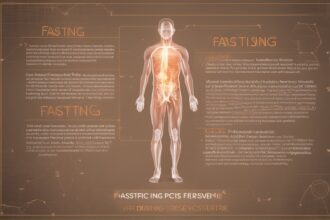Intermittent fasting (IF) has gained significant attention in recent years as a promising strategy for weight management, metabolic health, and longevity. As research continues to evolve, scientists and health professionals are exploring innovative approaches to intermittent fasting research to uncover its full potential. These cutting-edge methods are reshaping how we understand fasting’s impact on the body and mind, offering new insights into personalized health strategies. In this article, we delve into the latest advancements in intermittent fasting studies, focusing on novel research techniques and their implications for health and wellness.
The Evolution of Intermittent Fasting Research
Intermittent fasting is not a new concept; it has roots in cultural and religious practices dating back centuries. However, modern scientific inquiry into IF began in earnest over the past two decades, initially focusing on its effects on weight loss and metabolic markers. Early studies often relied on basic time-restricted eating models, such as the 16:8 method, where individuals fast for 16 hours and eat during an 8-hour window. While these studies provided foundational knowledge, they often lacked depth in understanding individual variability and long-term effects.
Today, innovative approaches to intermittent fasting research are moving beyond traditional models to incorporate advanced technologies and interdisciplinary methods. Researchers are now examining genetic, environmental, and lifestyle factors to create a more nuanced understanding of how fasting impacts different populations. This shift is helping to tailor fasting protocols to individual needs, paving the way for more effective and sustainable health interventions.
Personalized Fasting Protocols Through Genetic Research
One of the most exciting developments in intermittent fasting studies is the integration of genetic research to develop personalized fasting protocols. Scientists are exploring how genetic variations influence an individual’s response to fasting, including factors like metabolism, hunger hormones, and fat storage. By analyzing genetic markers, researchers can identify which fasting methods—such as alternate-day fasting or the 5:2 diet—are most likely to benefit specific individuals.
For instance, studies have shown that certain genetic profiles may respond better to shorter fasting windows, while others thrive on longer fasts. This personalized approach is a game-changer, as it moves away from the one-size-fits-all model and offers tailored recommendations. To learn more about the science behind personalized nutrition, check out our article on Personalized Nutrition and Fasting.
Technology-Driven Monitoring in Fasting Studies
Another innovative approach to intermittent fasting research is the use of wearable technology and mobile apps to monitor participants in real-time. Devices like smartwatches and continuous glucose monitors (CGMs) allow researchers to track metrics such as heart rate, blood sugar levels, and sleep patterns during fasting periods. This data provides a detailed picture of how the body responds to fasting at different times of the day or under varying conditions.
Moreover, apps designed for fasting research enable participants to log their meals, mood, and energy levels, creating a comprehensive dataset for analysis. These tools not only enhance the accuracy of studies but also make it easier for individuals to adhere to fasting protocols. For tips on using technology to support your fasting journey, explore our guide on Tech Tools for Fasting Success.
Neuroscientific Insights into Fasting and Brain Health
Recent intermittent fasting research has also taken a deep dive into its effects on brain health, leveraging neuroscience to uncover how fasting influences cognitive function and mental well-being. Studies using brain imaging techniques, such as functional MRI (fMRI), have revealed that fasting may enhance neuroplasticity—the brain’s ability to adapt and form new connections. This could have implications for preventing neurodegenerative diseases like Alzheimer’s.
Additionally, fasting has been shown to increase the production of brain-derived neurotrophic factor (BDNF), a protein linked to learning and memory. These findings suggest that intermittent fasting could be a powerful tool for mental clarity and emotional resilience. Researchers are now exploring how different fasting schedules impact brain health, further emphasizing the need for innovative approaches to intermittent fasting research. Curious about fasting and mental health? Read more in our post on Fasting for Mental Clarity.
Microbiome Studies and Fasting’s Gut Health Connection
The gut microbiome plays a crucial role in overall health, and innovative intermittent fasting research is shedding light on how fasting affects microbial diversity. Advanced sequencing technologies are being used to analyze changes in gut bacteria during fasting periods, revealing that IF may promote the growth of beneficial microbes while reducing harmful ones. This balance is essential for digestion, immunity, and even mood regulation.
Emerging studies suggest that fasting could help “reset” the microbiome, potentially alleviating conditions like irritable bowel syndrome (IBS) or obesity. By combining microbiome analysis with fasting protocols, researchers are uncovering new ways to optimize gut health through diet timing. This area of study is still in its infancy, but the implications are vast, offering a promising frontier for personalized health strategies.
Longitudinal Studies and the Future of Fasting Research
While short-term studies have provided valuable insights into intermittent fasting, there is a growing emphasis on longitudinal research to understand its long-term effects. Innovative approaches to intermittent fasting research now include multi-year studies tracking participants’ health outcomes, such as cardiovascular risk factors, aging markers, and disease prevention. These studies aim to answer critical questions about the sustainability and safety of fasting over extended periods.
Furthermore, researchers are incorporating machine learning and artificial intelligence to analyze vast datasets from these studies, identifying patterns that might not be apparent through traditional methods. This data-driven approach is helping to refine fasting recommendations and predict outcomes for diverse populations. For a deeper dive into the long-term benefits of fasting, see our article on Long-Term Benefits of Fasting.
Disclaimer: The information provided in this article is for educational purposes only and should not be considered medical advice. Intermittent fasting may not be suitable for everyone, and individual results can vary based on health conditions, lifestyle, and other factors. Always consult with a healthcare professional or registered dietitian before starting any fasting regimen or making significant changes to your diet. We are not responsible for any adverse effects resulting from the application of the information discussed in this post.
References
- de Cabo, R., & Mattson, M. P. (2019). Effects of Intermittent Fasting on Health, Aging, and Disease. New England Journal of Medicine.
- Longo, V. D., & Panda, S. (2020). Fasting, Circadian Rhythms, and Time-Restricted Feeding in Healthy Lifespan. Nature Reviews Endocrinology.
- Patterson, R. E., & Sears, D. D. (2017). Metabolic Effects of Intermittent Fasting. Annual Review of Nutrition.
- Cienfuegos, S., et al. (2021). Effects of 4- and 6-h Time-Restricted Feeding on Weight and Cardiometabolic Health. Frontiers in Nutrition.
- Sutton, E. F., et al. (2018). Early Time-Restricted Feeding Improves Insulin Sensitivity. Cell Metabolism.
This content is for informational purposes only and not a substitute for professional advice.






